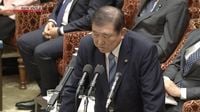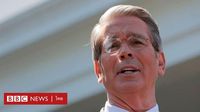On April 15, 2025, a series of significant discussions and developments unfolded in the realm of international trade, particularly involving the United States, Japan, and Oman. Former President Donald Trump engaged in talks with the Sultan of Oman, focusing on trade negotiations and the impending discussions with Iran scheduled for the following Saturday. This meeting, as reported by Investing.com, was confirmed by White House spokesperson Caroline Leavitt, who emphasized Trump's aim to ensure Iran does not acquire nuclear weapons while also addressing U.S. operations against Houthi forces in Yemen.
The discussions between Trump and the Sultan highlighted the complexities of U.S. foreign relations and trade dynamics in the Middle East. Leavitt noted that the talks aim to bolster economic ties and security cooperation, indicating that the U.S. is keen on maintaining a strategic partnership with Oman amid broader regional tensions.
In a separate but equally crucial development, Japanese Prime Minister Shigeru Ishiba addressed the nation regarding Japan's approach to upcoming trade talks with the United States. During a budget committee meeting on April 14, Ishiba reiterated Japan's commitment to carefully evaluating the implications of U.S. tariff policies on Japanese exports, particularly in the automotive sector. With Japan exporting approximately 1.37 million vehicles to the U.S. in 2024, accounting for 28.3% of its total exports, the stakes are high.
"We will not rush to reach an agreement on tariff measures, as it is essential to achieve outcomes aligned with our national interests," Ishiba stated, reflecting Japan's cautious stance in navigating the complexities of trade negotiations with the U.S.
As Japan prepares for bilateral discussions, Deputy Prime Minister Jitin Prasong emphasized the importance of cooperation and mutual benefits in trade relations. He plans to visit the U.S. on April 16, 2025, to initiate these discussions, aiming to foster a collaborative approach that benefits both nations.
Prasong's comments came amid concerns over U.S. tariffs on automotive imports, which have raised alarms within Japan's automotive industry. The Japanese government is keenly aware that these tariffs could have a ripple effect across various sectors, including steel and distribution, which are intricately linked to the automotive supply chain.
Meanwhile, the U.S. domestic landscape is witnessing shifts in trade policy under Trump's administration. The recent decision to suspend reciprocal tariffs, as reported by BBC News, has stirred debates among trade experts. Scott Bessent, the former portfolio manager who has emerged as a key figure in these discussions, noted that strong-arm tactics to address trade imbalances will not yield long-term success.
"It takes great courage to stand firm on this approach, especially given the market's volatility," Bessent remarked during a press conference on April 9, 2025. His comments reflect the internal dynamics within the Trump administration, where varying perspectives on trade policy have led to confusion and market fluctuations.
William Alan Reinsch, a trade expert, highlighted the contrasting roles within Trump's trade team, suggesting that Bessent is taking the 'tit-for-tat' approach seriously, while others like Peter Navarro and Howard Lutnick hold more aggressive stances. This internal friction raises questions about the coherence of U.S. trade policy moving forward.
As the landscape evolves, experts warn that Trump's disregard for multilateral institutions could undermine international cooperation in trade and finance. Mark Sobel, who has extensive experience in international economic policy, cautioned that the administration's approach may hinder collaborative efforts necessary for global economic stability.
In light of these developments, the Japanese government is not only preparing for its own trade negotiations but is also analyzing the broader implications of U.S. policies on global economic relations. Agasawa Reizo, the Deputy Minister overseeing economic policy, noted that Japan's previous trade relations with the U.S. have been beneficial, but the current climate necessitates a more strategic approach.
"We must analyze the situation thoroughly and not rush into decisions that may have adverse effects on our economy," Agasawa stated, underscoring the importance of a well-considered strategy in navigating the complexities of international trade.
As the discussions unfold, both Japan and Oman are poised to play crucial roles in shaping the future of U.S. trade relations. The outcomes of these negotiations will likely have lasting impacts on economic ties and geopolitical dynamics in the region.
In conclusion, the interplay of trade negotiations between the U.S., Japan, and Oman reflects the intricate balance of economic interests and geopolitical considerations. As these discussions progress, stakeholders on all sides will be watching closely to gauge the implications for global trade and economic stability.






